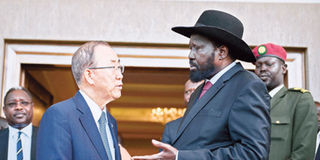US makes UN push for South Sudan sanctions

UN Secretary General Ban Ki-moon (L) talks with South Sudan's President Salva Kiir (R) in Juba on May 6, 2014
What you need to know:
The measure was submitted to the Security Council a day after Ethiopia opened a new round of negotiations between the warring sides that were billed as a final opportunity to reach a settlement.
The United States on Tuesday presented a UN draft resolution on imposing sanctions in South Sudan where warring factions have repeatedly failed to abide by agreements to end 14 months of war.
The measure was submitted to the Security Council a day after Ethiopia opened a new round of negotiations between the warring sides that were billed as a final opportunity to reach a settlement.
Under the resolution, the Security Council could impose targeted sanctions such as a global travel ban and an assets freeze on individuals who are deemed a threat to the stability of South Sudan.
The draft raises the possibility of imposing an arms embargo on South Sudan, a measure strongly backed by European countries despite concerns that the ban could penalize President Salva Kiir’s forces more than the rebel fighters of Riek Machar. “The political leaders have repeatedly failed to put their narrow political and economic agendas aside in order to find political solutions that could bring a measure of stability,” a US official said.
“In light of that, our goal is to work with our partners to move forward with a sanctions resolution that will lay the groundwork for imposing costs on those who continue to fail to work toward a solution,” said the official who spoke on condition of anonymity.
Seven previous ceasefires have failed to take hold in South Sudan, which exploded into violence in December 2013 after a falling-out between Kiir and his then vice president Machar.
UN peacekeeping chief Herve Ladsous told the 15-member council that prospects for a breakthough were dim.
“The likelihood that either side could soften its stance remains low,” Ladsous said.
Tens of thousands of people have died in the 14-month conflict, 1.5 million have been displaced and 2.5 million are in dire need of food aid in South Sudan, which declared independence from Sudan in 2011.
More than 113,000 civilians have fled to UN bases for protection as government troops and fighters are accused of waging terror campaigns of rape and killing.
Regional negotiators have now set a deadline of March 5 for Kiir and Machar to reach a final peace deal that includes a transitional unity government.
A second deadline of April 1 has been set to launch preparations for the transition that should be completed no later than July 9. US officials described the two deadlines as “milestones” and said the Security Council would decide at those times whether to move forward and impose sanctions, once the resolution is adopted.
A vote on the US-drafted resolution at the Security Council could take place next week, diplomats said. The draft resolution threatens sanctions against those involved in recruiting child soldiers or who block deliveries of humanitarian aid as well as leaders who fail to advance peace negotiations.
(AFP)
It provides for a panel of experts to be established and a sanctions committee that will report to the Security Council on the situation in South Sudan.
The United States announced plans in November to present a sanctions resolution, but the measure ran into resistance over the arms embargo provision and shifting positions from African governments in the region.
Over two dozen armed forces including government soldiers and allied militia backed by Ugandan soldiers on one side, and a range of rebel factions on the other have been battling it out for the last 14 months.
Fighting has raged this month in the northern Upper Nile state, with the government warning that rebel forces were splintering, making any negotiations increasingly complicated.(AFP)




